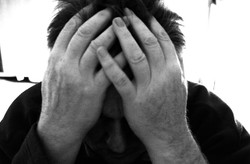According to Erving Goffman there are three types of social stigma.
1. According to appearance i.e. Leprosy, Anorexia Nervosa, Physical disability, Social obesity.
2. Deviations in personal traits, mental illness, drug addiction, alcoholism, criminal background.
3. Tribal traits real or imagined; ethnic group, nationality, religion, social class.
When considered too different people become stigmatized, in other words denied full status as a human being and become ' only someone with a disability' or' only a member of a street gang, or 'only a mental patient'
As people have less roles available at work or socially they adopt differing ways to deal with it.
One strategy is withdrawal, only mixing with others experiencing the same problem. This makes life easier in the short term but does nothing to dispel myths.
Others control the stigma by hiding the condition, not telling employers about health problems, not telling family or close friends. This can cause problems because if it 'comes out' they are seen as deceitful.
Direct confrontation, is happening more than ever before because quite a few celebrities have led the way in this;
Mohammed Ali Parkinson's disease
Robbie Williams' Bipolar disorder
Paralympic stars, showing people with quite serious disabilities do not have to be helpless victims
Sometimes the person is stigmatized indirectly, for example the deaf worker not being told jokes by the others and thinking they nay be the subject of the humour,
Now people are judged for certain illnesses, such as C.O.P.D - it must be their own fault for smoking, when really it can also affect non smokers.
The family of someone with a mental illness may be assumed to have the same condition, and not taken seriously.
There is still a perception from some that people with mental illnesses are weak and stupid.
Many older people and some young people suffer from incontinence and find it very difficult to tell others as it is not talked about.




 I like long hairon 05/11/2016
I like long hairon 05/11/2016
 Traditionally British Football Fanon 01/20/2016
Traditionally British Football Fanon 01/20/2016
 More About Spiritualismon 01/20/2016
More About Spiritualismon 01/20/2016
 IN PRAISE OF CABBAGEon 01/20/2016
IN PRAISE OF CABBAGEon 01/20/2016


Comments
Thank you for feedback folks
People putting the telly on 'as background noise', when there's a partially deaf person in the room. Yep, I know all about it.
Thank you for a thought-provoking article.
Interesting thoughts and post. I agree that there are a lot to be done as it regards stigma and discrimination both as societies and individuals.